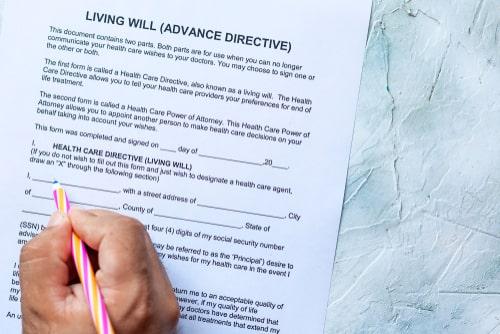What Advance Medical Directives Are Available in New York?
Posted on January 28, 2022 in Estate Planning
 A key part of the estate planning process involves making decisions about a person’s end-of-life care. This can be especially important for people who are elderly, although addressing medical decisions may be beneficial at any age. Advance medical directives will allow a person to decide what types of medical care they do or do not want to receive in different situations, and they can ensure that their wishes will be followed if they encounter health issues that make it impossible to make their preferences known. Residents of New York will need to understand how the state’s laws address these issues, and they can take steps to prepare for the future and avoid uncertainty for themselves and their loved ones.
A key part of the estate planning process involves making decisions about a person’s end-of-life care. This can be especially important for people who are elderly, although addressing medical decisions may be beneficial at any age. Advance medical directives will allow a person to decide what types of medical care they do or do not want to receive in different situations, and they can ensure that their wishes will be followed if they encounter health issues that make it impossible to make their preferences known. Residents of New York will need to understand how the state’s laws address these issues, and they can take steps to prepare for the future and avoid uncertainty for themselves and their loved ones.
Advanced Directives in New York
A person can address their medical care by naming a person who can make medical decisions on their behalf and creating documents that detail their decisions about treatment. A Health Care Proxy will allow a person to appoint a Health Care Agent who will be authorized to make decisions for them if they cannot make decisions on their own. These decisions may include whether life-sustaining treatment such as nutrition or hydration will be provided and whether the person should be resuscitated if their heart stops beating. A Health Care Proxy can detail a person’s wishes in these matters, but if these wishes are not specified, the agent may make decisions based on what they believe would be in the person’s best interests.
In addition to or instead of a Health Care Proxy, a person can create a living will that details their wishes for the types of end-of-life treatment they want to receive. This document will address situations where the person has been diagnosed with an incurable condition that will result in their death, and they cannot make their wishes known. A living will can specify that a person does or does not want to receive certain types of treatment. For example, it may state that a person should be kept alive as long as possible, or it may state that life-sustaining treatment should be withheld and treatment should be limited to palliative care such as medication meant to ease pain and provide comfort.
New York also allows for the creation of other types of documents that address end-of-life medical treatment. A Do Not Resuscitate (DNR) Order will state that a person does not want to receive CPR or other emergency lifesaving procedures if their heart stops beating or they stop breathing. Medical Orders for Life Sustaining Treatment (MOLST) can also be completed with the assistance of a medical professional, and they will detail a person’s preferences regarding different forms of treatment, such as CPR or the use of a ventilator.
Contact Our NYC Advance Medical Directive Lawyers
Whether you are creating an estate plan or helping a family member make decisions related to end-of-life care, you will want to make sure to understand your legal options. At Mandelbaum Barrett PC, we can help you make decisions about these issues and put the legal documentation in place to ensure that your wishes will be followed correctly. Contact our Metro New York estate planning attorneys at 203-661-6000 to set up a complimentary consultation and get the legal help you need.
Sources:
https://ag.ny.gov/sites/default/files/advancedirectives.pdf


 A key part of the
A key part of the 






